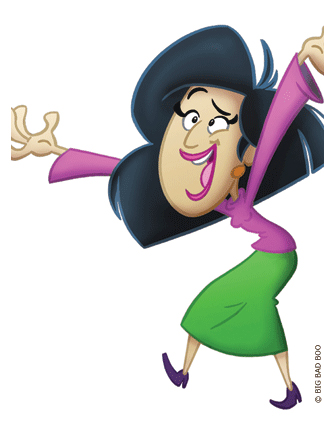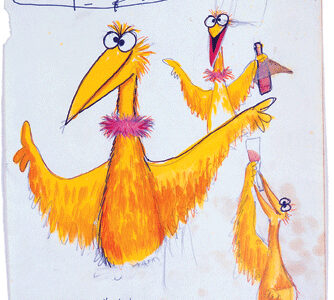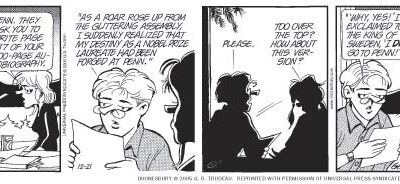
Class of ’95 | Asked whether it was a dormant creative gene that prompted Shabnam Rezaei C’95 EAS’95 to leave a successful career in the financial-software industry to start her own animation studio, she laughs and retorts: “I couldn’t draw a stick figure if my life depended on it.”
In fact, the path that Rezaei followed on her unconventional journey had decidedly conventional origins.
“My father is an engineer; my mother is a doctor,” she says. “As a good Iranian girl, I was meant to do something that was going to pay the bills.”
Rezaei first left Iran alongside her brother, Mohammad Rezaei C’92 EAS’92, when she was 10 years old; her parents sent the two to the American International School in Austria. Her brother arrived at Penn in 1989. Shabnam followed three years later. Both secured dual degrees.
Her goal was to “get a good job with a good company” and become a “productive member of society,” she says. “That was really all my parents wanted of me.”
“And it was a really nice career,” she says of her 10 years at financial-consulting firms like Exis, Misys Banking Systems and Deloitte & Touche. But it “wasn’t meaningful to me.”
Rezaei was also sensitive to shifting attitudes toward Middle Eastern immigrants following 9/11. After earning her MBA from NYU in 2002, she still yearned to do something that would make a difference. “The world was not in a good place,” she explains, “and I wondered if there was anything I could do to change that.”
By 2004, Rezaei had become a voice in a larger cultural dialogue by creating a website called PersianMirror.com. Featuring a business directory, events listings, and cultural articles geared toward Persian Americans, the site was soon attracting close to three million viewers a month.
Among that growing audience was a television writer from Los Angeles who approached Rezaei with a business proposal. He wanted to create a short, animated feature for Iranian-American children—“sort of like A Charlie Brown Christmas,” she says, but celebrating the Iranian new year, Norooz. Rezaei agreed to help promote the project, and after she and her husband, Aly Jetha, visited Los Angeles, they decided to invest their own money in it.
In creating Babak and Friends—A First Norooz, Rezaei found just the sort of meaningful opportunity she’d been seeking. “Here was something that could really change the lives of children. Instead of being embarrassed by the food they eat, or the clothes they wear, or speaking Farsi to their parents in front of their friends—we could make those things fun, and something to be proud of.”
Babak and Friends was released direct-to-DVD in the spring of 2005. The same year, Rezaei and Jetha brought the DVD and a plan to promote its sale to the NYU Stern Business Plan Competition. They won.
“Everybody got what we were trying to do, right away,” she says, “even if they weren’t Iranian—and actually, nobody was Iranian. I was the only Iranian. Even the guy who got in touch through the site and started this whole thing was only half Iranian. That didn’t matter. Everybody understood the need for this.”
The competition’s judges encouraged Rezaei and her team, then known as Norooz Productions, to think beyond the niche of a single animated special to a more scalable enterprise with an even larger cultural reach. Later that year, they formed Big Bad Boo Studios.
In 2007, Rezaei left her job with Misys to become Big Bad Boo’s managing director. After establishing an office in Vancouver, they worked on a children’s series called Mixed Nutz, which features their original Iranian character, Babak, and also gives him Cuban, Indian, and Korean friends named Damaris, Sanjay, and Jae. The series, set in a nondescript Western school in a fictional locale called Dyver City (sound it out slowly), makes its U.S. television debut this spring on 27 PBS stations.
Next up for Rezaei and Big Bad Boo is a pair of promising ventures. One is an animated rendering of 1001 Nights (also known as Arabian Nights), which features such classic tales as “Aladdin’s Wonderful Lamp,” “The Seven Voyages of Sinbad the Sailor,” and “Ali Baba and the Forty Thieves”. The other is an online store, Oznoz.com, that will offer Big Bad Boo videos as well as multicultural and language-learning products for kids.
Rezaei hopes that her company’s work will help the next generation understand the benefits of an international education—like the one she received—no matter where they live.
“Realize that in life, a different perspective isn’t necessarily wrong,” she says. “It’s just different.”
—Rachel Estrada Ryan C’00




